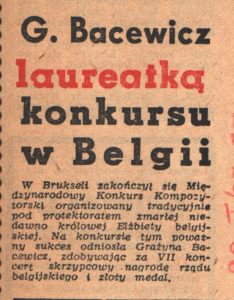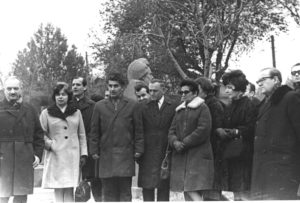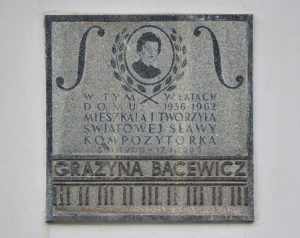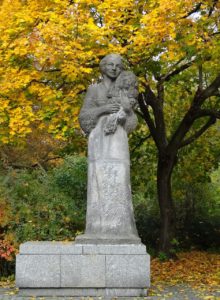In a letter to her brother Vytautas Grażyna Bacewicz described a family scene, half-sad, half-funny, when the composer’s mother, very ill at the time, issued an “instruction” ordering that after her death (she died on 18 July 1958) the head of the family should be a person with the best predispositions, mentally the strongest, i.e. … her daughter Grażyna. Mrs Modlińska knew her loved ones very well and she concluded that despite her many obligations Grażyna would fulfil this task best. Grażyna did not object, but she said that she would willingly help or provide advice, but had no intention of imposing anything. This is indeed what happened.
In her official biography the last decade in the composer’s life was a period of creative synthesis, which produced many important works, including String Quartet No. 6 (1960), Pensieri notturni (1961), Concerto for Large Symphony Orchestra (1962), Cello Concerto No. 2 (1963), Quartetto per 4 violoncelli (1963), cantata Akropolis(1964) as well as a number of pieces from the extraordinarily prolific year 1965, e.g. Violin Concerto No. 7, Piano Quintet No. 2, String Quartet No. 7, Musica sinfonica in tre movimenti and Divertimento for string orchestra. In the years that followed she wrote Concerto for Two Pianos and Orchestra (1966), Contradizione for chamber ensemble (1966), In una parte for orchestra (1967), Concertofor Viola and Orchestra (1968), 4 Capricci for Violin Solo(1968) and, finally, in 1969, the unfinished ballet Desire. The most important award from that period was the award of the Belgian Government and Gold Medal at the Queen Elisabeth Competition in Brussels for her Violin Concerto No. 7.
- Press note on Bacewicz’s success in Belgium (Głos Robotniczy, 22 January 1966) (PWM)
The profusion of works written in those years could suggest titanic efforts on the part of the composer, who had withdrawn from life and remained completely absorbed in the world of sounds. But this was not the case. Grażyna obeyed her mother’s last will with true devotion. She was interested in the family affairs, but most of all she looked after her daughter Alina who had begun her studies at the Academy of Fine Arts. In late 1959 Grażyna underwent a surgery, which fortunately excluded the presence of cancer. As a result she could go to Italy with her daughter in July 1960, following an invitation from her husband’s cousin. For an Academy of Fine Arts student this was, of course, a valuable experience. In 1961 Grażyna and Vytautas finally met in Paris. Grażyna arrived there with sister Wanda and daughter Alina, whom Vytautas could now meet in person after years of exchanging letters. In her correspondence after returning to Poland Grażyna wrote movingly about a meeting of loved ones separated by fate, stressing that the siblings “got to know each other anew”.
In April 1962 the composer again was member of the jury at the International Tchaikovsky Violin Competition in Moscow. This time she took her daughter with her. Taking advantage of a break between the first and the second stage of the competition, both women travelled to Leningrad, and visited the Hermitage Museum. Back in Poland, life went on “like on a volcano”, as Grażyna described the family situation at the time. In the autumn that year Alina got married and Grażyna decided to move to a smaller flat, especially given the fact that her husband’s worsening illness excluded any private practice, which he had run in a room in the flat in ul. Koszykowa, adapted for the purpose. Professor Andrzej Biernacki died on 30 July 1963.
Grażyna did not slow down even for a moment, although in letters to family members she told them she would give up social life, because she felt tired and would like to devote most of her time to composing. But she was not entirely faithful to these resolutions. Until the very end of her life she continued to serve, with short breaks, as Vice President of the Polish Composers’ Union. In early April 1964 she and her colleagues welcomed Nadia Boulanger to Warsaw after her arrival from Kraków, where the Mademoiselle had conducted a concert featuring works by her sister Lili as well as classes with students. The next few years were filled with travelling to attend performances of her works in Yugoslavia (1964) and Stockholm (1965), Conference of Presidiums of Composers’ Unions from the so-called socialist democracies in Bucharest (1965), festivals in Cheltenham and London (1967), International Violin Competition in Poznań as chair of the jury (1967), International Violin Competition in Naples as member of the jury (1967) and String Quartet Completion in Budapest as member of the jury (1968). Grażyna Bacewicz attended every Warsaw Autumn Festival, not only to witness the premieres of her own works. She turned into the life and soul of the party. In 1964, after the end of the festival, she organised a party at her flat featuring guests like Danuta and Witold Lutosławski, and Michał Spisak, very warmly received during festival concerts, who had come from Paris with his wife. Grażyna intuitively felt that this was a farewell to her fellow composer. Michał Spisak, who was already very ill at the time, died on 29 January 1965 in Paris.
Despite her union and community commitments, Grażyna paid a lot of attention to her family. Asked by Vytautas, she gave him a lot valuable advice concerning composition. When writing to her brother, she often asked him for special cigarette holders with filters, which were not available in Poland. But on 5 December she wrote, “I find it difficult to work, because I don’t smoke – I haven’t been smoking for 80 days. I want to give up completely.” In a letter of 13 May 1967 she boasted, “I haven’t been smoking for 240 days.” Did she persevere? We do not know.
June 1966 was marked by the birth of Grażyna’s granddaughter Joanna. That year was also a moment of an important decision in her professional career. As of the new academic year, 1966/1967, the composer became Head of Composition at the State School of Music in Warsaw. She was very serious about her new role. She replied in detail to a letter from the Art Schools Authority concerning the new schedule for Faculty I, writing that
Having studied the draft new schedule for Faculty I of the State School of Music, I am not sure whether I have correctly understood the principle of a unitary course of study. It does not seem possible that the authors of the draft would suggest that the teaching of composition and conducting should not commence until year two. If this is the case, then I categorically object to such a concept, especially with regard to future composers. While I could agree with this extraordinary caution expressed in a unitary course of study for future conductors, as it is difficult to detect talent in this respect (sometimes young conductors develop very slowly), the same caution applied to future composers seems unjust to me. Young people who, in fact, begin to “compose” already in high school should not be left to their own devices in year one without any pedagogical assistance. They are full of ideas, waiting for advice, seeking practical help.
The “Citizen Professor” (he was made full professor in 1967) went on to provide a detailed analysis of the schedule, suggesting that the number of orchestra classes for composers be increased and that the general and theoretical timetable be corrected. Towards the end she revealed her own views concerning the existing division into “serious” and “non-serious” music. As she wrote,
And the last thing: jazz and popular music seminar – 2 hours (a week) over the course of 2 years! Isn’t this too much? Isn’t this an encouragement to abandon serious art? Aren’t young people thus being encouraged to choose a less ambitious, easier and more profitable ‘profession’?
Grażyna Bacewicz had a few pupils, including the then thirty-year-old trainee from Croatia (at that time officially from Yugoslavia), Dubravko Detoni, one of whose scores she recommended to Andrzej Markowski. She strove to maintain friendly relations with her pupils and when she saw real commitment, she helped them in various, also private matters.
In March 1968 Grażyna had to face a challenge which she most likely had not predicted, trying over the years to stick to a morally acceptable compromise in her attitude to the authorities. On 11 March she chaired, as Vice President, a routine meeting of the Presidium of the Board of the Polish Composers’ Union. According to those who witnessed the event, a moment before the meeting was due to begin, Zygmunt Mycielski arrived with a draft letter in which composers were supposed to express their support for the famous position adopted by the Extraordinary General Assembly of the Warsaw Brach of the Polish Writers’ Union with regard to the “March events”. Supported by her colleagues – members of the Presidium – Grażyna firmly opposed the idea. As she explained later, this restraint was dictated by her lack of full knowledge of the complicated political and social situation as well as fear of putting anyone at risk of some repressions. She managed to emerge from this very difficult situation unscathed, and the respect for and trust in her of her colleagues, also from outside the PCU Board, did not diminish.
After such a difficult experience she thought only about music and the projects she intended to carry out. And they were serious projects. Commissioned by Stefan Kamasa, she was writing a Concerto for Viola and Orchestra. She also agreed, despite initial resistance, to compose music to the ballet Desireafter Pablo Picasso’s Le désir attrapé par la queue with a libretto by Mieczysław Bibrowski. The work on the ballet was interrupted in December 1968 by a visit to Armenia to attend the Polish Music Decade celebrations. They featured another (after Warsaw) performance of her Concerto for Two Pianos and Orchestra with Jerzy Maksymiuk and Jerzy Witkowski.
- Grażyna Bacewicz in Armenia, 1968 (PWM)
As the composer’s sister, Wanda, later recalled, she did not feel well as she was leaving for Armenia, but did not to disappoint the artists or the audience.
The winter of 1968/1969 was exceptionally severe. On 10 January a concert of Tadeusz Baird’s compositions was to be held at the Philharmonic Hall. Grażyna decided to give colleague a nice surprise by attending it. She lived nearby with her sister, in another two-bedroom flat in ulica Hibnera (today Zgoda), so she went out wearing only evening shoes. After the concert she felt unwell. Initially, she was diagnosed only with flu-related complications. But her condition continued to deteriorate. Grażyna Bacewicz died on 17 January 1969 at the age of 60. For many in the musical world this was a real shock. She left an indelible mark, plans for the future and an unfinished ballet.
She was buried in the Avenue of the Meritorious at the Powązki Cemetery. Several music schools in Poland are named after her, as is a street in the Ursynów district of Warsaw. Among the many statues of Polish composers in front of the Pomeranian Philharmonic Hall in Bydgoszcz stands a statue of Grażyna Bacewicz by Ewelina and Hendryk Siwicki. On the house at ulica Koszykowa 35, where Grażyna Bacewicz spent so many years of her life, a plaque with the following inscription was installed in 1983: “The world-renowned composer Grażyna Bacewicz lived and worked here in 1936–1962”.
- Plaque commemorating Grażyna Bacewicz on the wall of the house in ul. Koszykowa, Warsaw
- Statue of Grażyna Bacewicz in the Jan Kochanowski park in Bydgoszcz’s musical district



